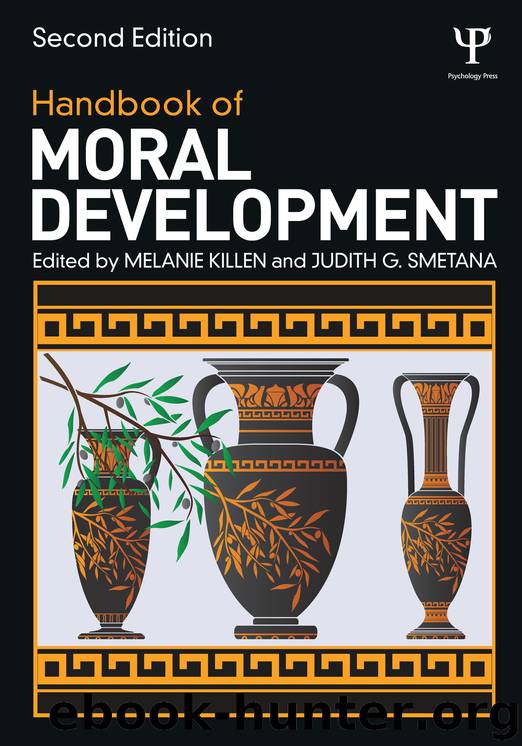Handbook of Moral Development by Unknown

Author:Unknown
Language: eng
Format: epub
ISBN: 9781136673238
Publisher: Taylor & Francis Ltd
13
The Early Ontogeny of Human Cooperation and Morality
Amrisha Vaish and Michael Tomasello
The seminal work in the modern study of children’s moral development is Piaget’s (1932/1997) The Moral Judgment of the Child. As is well known, Piaget claimed that before the age of 8 or 9 years children make moral judgments based only on a respect for authority and the social norms emanating from this authority—and so they are not really autonomous moral agents. But, as is also well known, Piaget focused exclusively on the explicit moral judgments that children were capable of formulating in language. Kohlberg’s extension of Piaget’s framework (e.g., Colby & Kohlberg, 1987; Kohlberg, 1969, 1976) also asked children to express their reasoned moral judgments linguistically, and also found that preschool children were essentially premoral (i.e., preconventional).
Turiel and colleagues (Killen, 1991; Smetana, 2006; Turiel, 2006; Turiel, Killen, & Helwig, 1987) contested the Piaget–Kohlberg picture of preschoolers as premoral or pre-conventional. In their theory and research, 3- to 6-year-old children already understand a good deal about morality; specifically, they distinguish moral norms from social conventions, judging that only moral norms are obligatory, universally applicable, and not derived from adult authority. Thus, while a boy might find it silly to wear a dress, he could do so if an adult authorized it or if he belonged to another culture in which it was acceptable, but it would be wrong for him to hit an innocent child, even if an adult authorized it and even in other cultures. Much data support this view of preschool children as at least somewhat competent in their judgments about morality (for reviews, see Smetana, 2006; Turiel, 2006).
Work from the past few decades has thus established that moral understanding begins early in development, certainly far earlier than Piaget and Kohlberg proposed, and concerns quite subtle and differentiated judgments. But all of this research has been almost exclusively cognitive (or social–cognitive) in nature. In contrast, in this chapter, we approach children’s early moral development from a somewhat different starting point. Following trends in moral philosophy and moral psychology, we consider children’s moral development in its evolutionary context. This means, first of all, that there is a focus not only on moral cognition and judgment but also on moral action. In evolutionary theory, action is always the primary level of analysis because natural selection only “sees” and “acts upon” actions, with any underlying motivations and cognitive processes selected for only insofar as they have effects on the organism’s (hopefully) adaptive actions. Second of all, this evolutionary perspective has also led researchers to focus on what is most likely the larger social context of human morality, namely, human cooperation in general. After all, the main social function of morality is arguably to regulate social interactions in the general direction of cooperation, given individuals who are at least somewhat selfish.
The outcome of this new research is the discovery that young children’s social behavior has a much stronger moral dimension, at much younger ages, than previously supposed. Although they cannot articulate
Download
This site does not store any files on its server. We only index and link to content provided by other sites. Please contact the content providers to delete copyright contents if any and email us, we'll remove relevant links or contents immediately.
Tools of Titans by Timothy Ferriss(8396)
Change Your Questions, Change Your Life by Marilee Adams(7782)
Deep Work by Cal Newport(7083)
Playing to Win_ How Strategy Really Works by A.G. Lafley & Roger L. Martin(6306)
Man-made Catastrophes and Risk Information Concealment by Dmitry Chernov & Didier Sornette(6019)
Big Magic: Creative Living Beyond Fear by Elizabeth Gilbert(5771)
Digital Minimalism by Cal Newport;(5764)
Ego Is the Enemy by Ryan Holiday(5448)
The Slight Edge by Jeff Olson(5417)
The Motivation Myth by Jeff Haden(5212)
The Laws of Human Nature by Robert Greene(5208)
Stone's Rules by Roger Stone(5088)
Tuesdays with Morrie by Mitch Albom(4784)
Eat That Frog! by Brian Tracy(4540)
Rising Strong by Brene Brown(4459)
Skin in the Game by Nassim Nicholas Taleb(4248)
The Money Culture by Michael Lewis(4207)
Bullshit Jobs by David Graeber(4190)
Skin in the Game: Hidden Asymmetries in Daily Life by Nassim Nicholas Taleb(4007)
